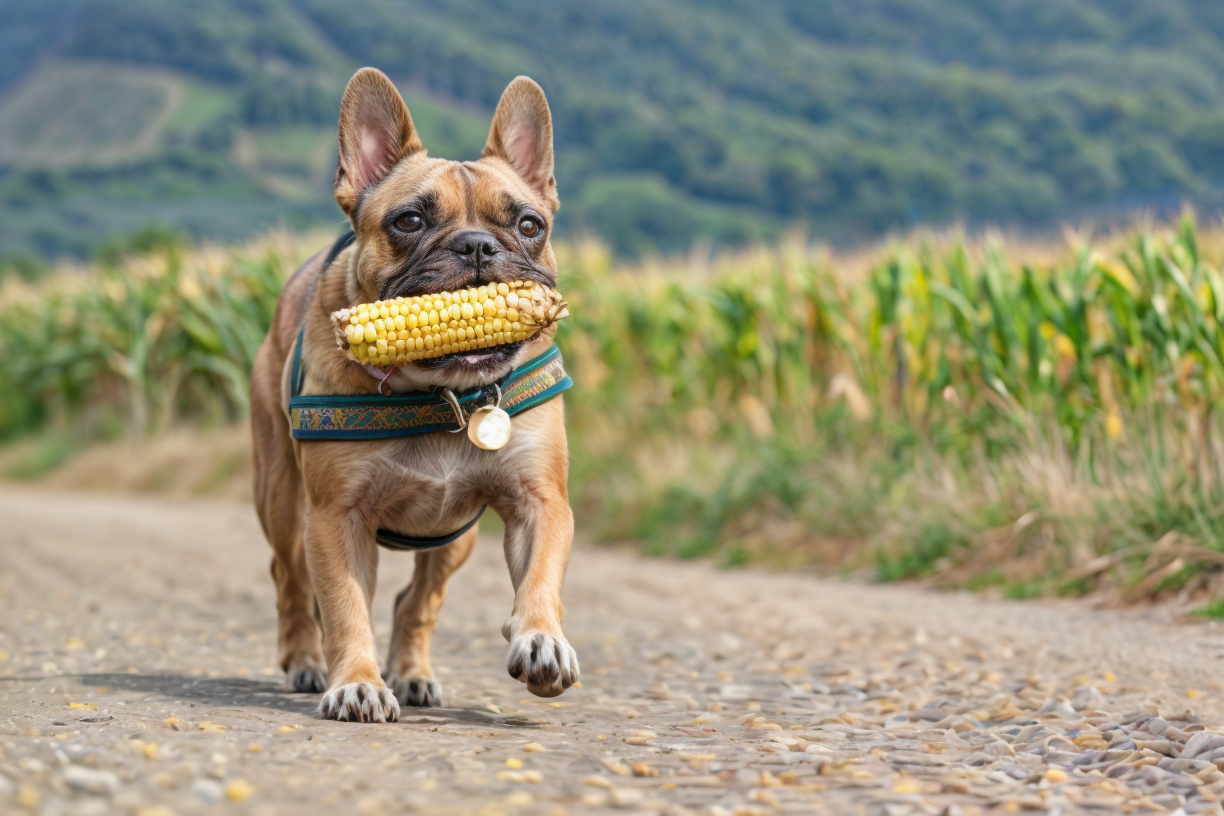Can Dogs Eat Corn :
From the cornfields of the Midwest to your summer barbecue, corn is a staple of many human diets. But as a dog owner, you might wonder, “Can dogs eat corn?” This seemingly simple question leads us into a nuanced discussion about the nutritional benefits and potential risks of corn in canine diets. We’ll sift through the kernels of truth from popular myths, provide expert advice, and share practical ways to include or exclude corn from your pup’s bowl.
The Nutritional Benefits of Corn for Dogs
Corn is a common ingredient in many commercial dog foods due to its nutritional profile. It’s a good source of carbohydrates, which provide energy, and contains essential amino acids that contribute to muscle growth and recovery. It also includes some healthy minerals and vitamins that support your dog’s overall health, such as:
- Magnesium: Necessary for muscle and nerve function.
- Phosphorus: Assists with bone health and energy production.
- Thiamine (Vitamin B1): Aids in converting food into energy and maintaining a healthy nervous system.
In some cases, dogs might benefit from a little bit of corn in their diet, especially if they are very active or need the extra energy to keep their tails wagging.
The Potential Risks of Feeding Corn to Dogs
Critics of corn in dog food often cite its high carbohydrate content, which can be a concern for some dogs, especially those with diabetes or obesity. Additionally, if your dog has a sensitive stomach or is prone to allergies, corn can be a trigger. Allergic reactions can manifest as skin issues, gastrointestinal problems, or even become a contributing factor to ear infections.
The other side of the debate is the processing of corn in commercial products. The form of corn used in many dog foods, especially lower-quality brands, is often more challenging for dogs to digest, leading to digestive upset, smelly stools, and a reduced ability to absorb nutrients from the food.
How to Safely Incorporate Corn into Your Dog’s Diet
If you’re determined that your dog should receive the benefits of corn, it’s crucial to do so sparingly and with attention to their individual needs. Here are some safe ways to incorporate corn:
- Fresh, Steamed, or Grilled Corn: When prepared simply, without added butter or salt, it can be a nice occasional treat.
- Cornmeal in Homemade Treats: If you’re a doggy baker, using cornmeal in moderation can add a pleasant texture to DIY dog biscuits or other snacks.
- Canned or Frozen Corn: These options can be practical and provide a change of pace in your dog’s diet, as long as they are plain and corn is not the main ingredient of their primary meal.
Moderation and monitoring your dog’s reaction are key. Start with small amounts to gauge tolerance, and if your dog has a sensitive stomach, consult with a veterinarian before making any dietary changes.
Alternatives to Corn for Dogs with Special Dietary Needs
If you’ve determined that corn isn’t the best fit for your dog, there are plenty of alternative options that offer similar nutritional benefits without the potential downsides:
- Sweet Potatoes: High in vitamins, minerals, and fiber, these are often more easily digested than corn.
- Peas and Beans: Legumes are excellent sources of protein and carbohydrates.
- Grain-Free Kibble: There are numerous grain-free dog food options that use alternative sources like potatoes, lentils, or tapioca in place of corn.
Again, speak to a vet to decide what’s best for your dog’s specific needs. They can help you design a balanced meal plan, or recommend commercial diets that avoid any problematic ingredients.
Opinions from Veterinarians and Animal Nutritionists
When considering any change in your dog’s diet, the best practice is always to consult with a professional. Both veterinarians and animal nutritionists can give you tailored advice based on your dog’s breed, age, health status, and other factors.
Some experts suggest that while corn can be included in a dog’s diet, it should not be among the main ingredients due to its potential for digestive issues and allergic reactions. On the other hand, for dogs without known sensitivities, corn can be part of a healthy, balanced diet in the right quantities and forms.
Real-life Experiences: Stories from Dog Owners
Understanding how different dogs react to corn can be both illuminating and relieving for dog owners. Many share their experiences online, detailing the benefits they’ve observed or the issues they’ve encountered when feeding their dogs corn.
One dog owner may report that their dog loves the occasional corn cob and shows no ill effects, while another may reveal that their dog experiences significant gastrointestinal distress after consuming even a small amount of corn. These anecdotal accounts serve as a reminder to stay vigilant and attentive to your own dog’s needs and behavior.
Conclusion: Summary and Final Recommendations
The debate over corn in dog food continues, and opinions are varied. While corn can offer certain nutritional benefits, it also presents potential risks, especially for dogs with specific health conditions. The safest approach is one of moderation, with any changes to your dog’s diet being introduced gradually and under the guidance of a professional.
When in doubt, trust the signs your dog gives you. If they enjoy and can tolerate corn, it can be a safe and healthy addition to their diet. If not, there are plenty of other options to keep your dog healthy and happy.
Call to Action
If you’re looking for more guidance on what to feed your dog, consider subscribing to our newsletter. We often share expert tips, case studies, and community knowledge to help you make the best decisions for your furry friend. Remember, a well-nourished dog is a happy dog – and a happy dog owner too!
